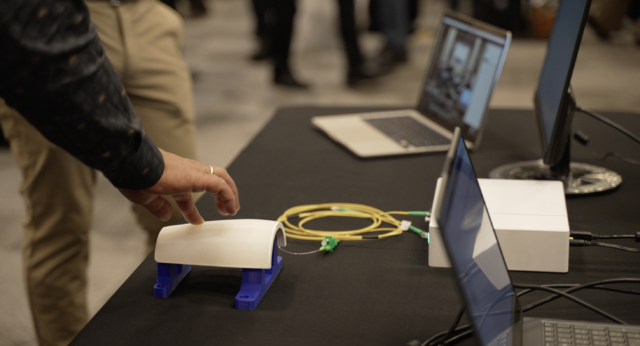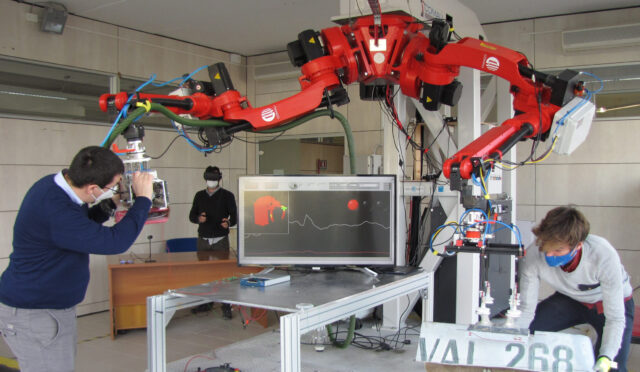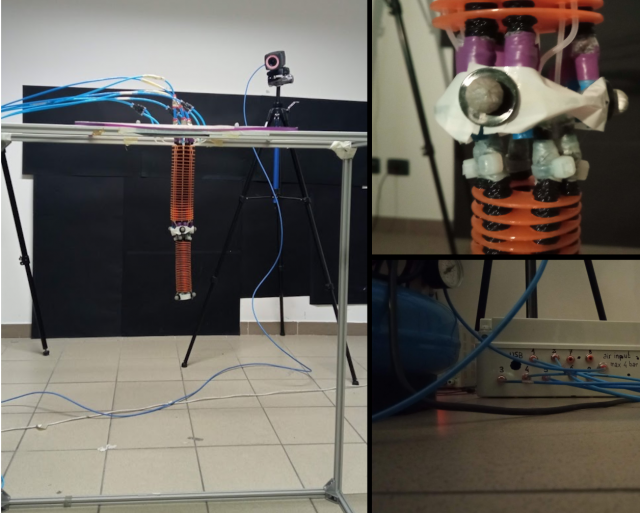UWE Bristol University Enterprise Zone
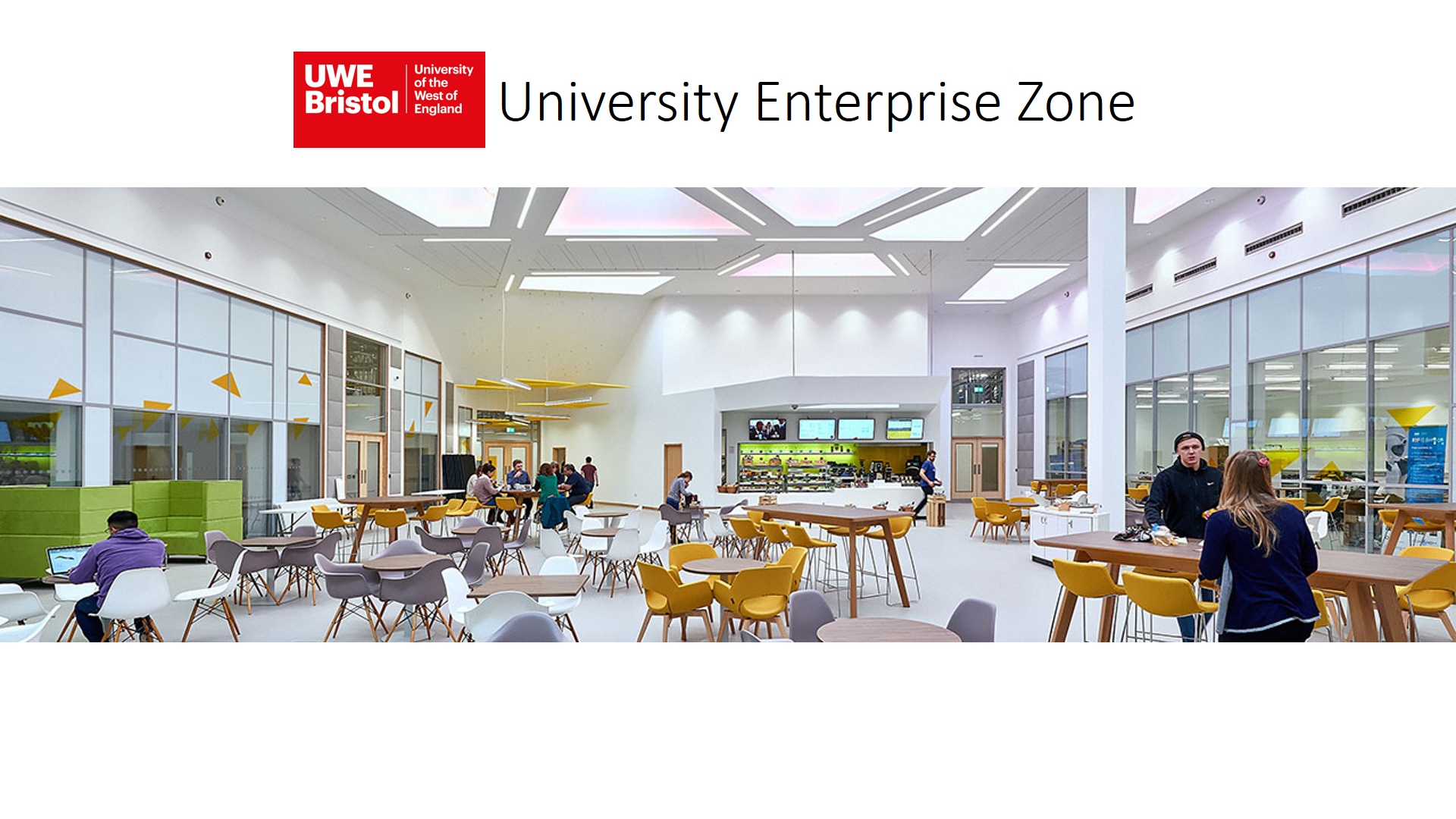
The University Enterprise Zone (UEZ) promotes collaboration between the University of the West of England and Industry. It embraces business incubators, grow on space and SME support services, and is home to over 80 companies specialising in technology, robotics, automation, health technology and biosciences.
THREE INCUBATORS – AN ENTERPRISE ECOSYSTEM
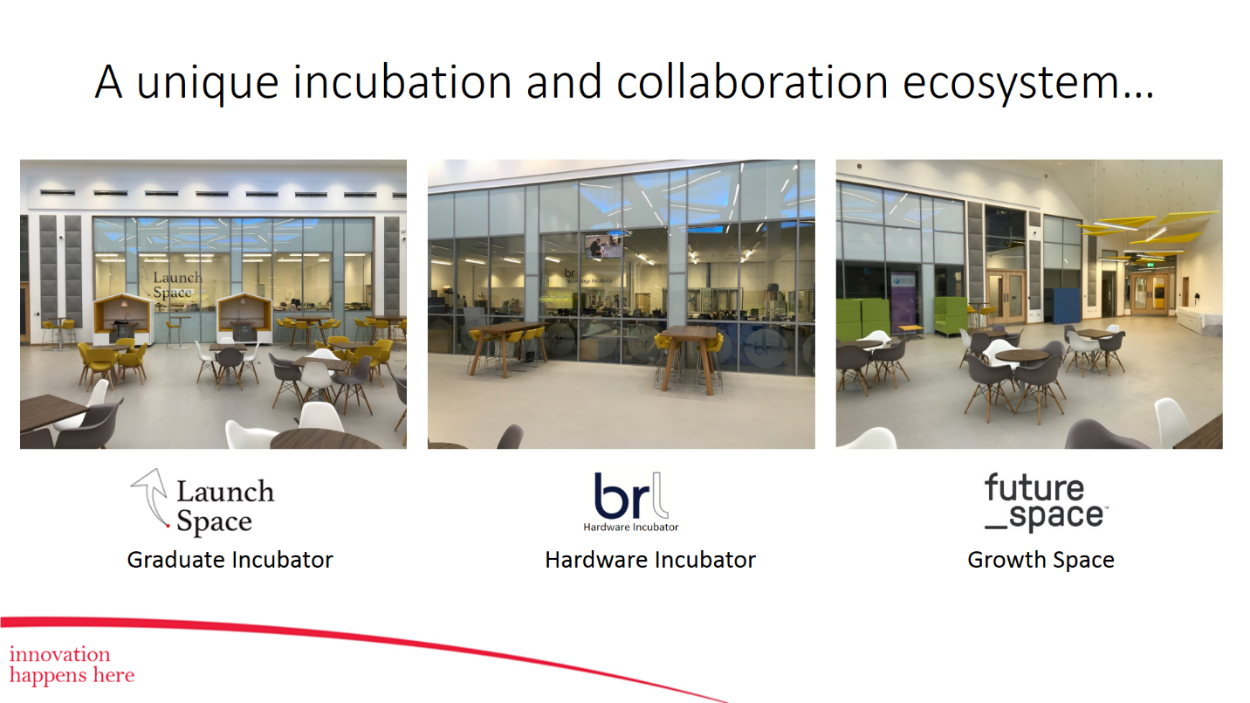
Three Incubators are the foundations of the enterprise ecosystem within the UEZ.
-
Launch Space offers recent graduates a free years accommodation and business support
-
BRL’s Hardware Incubator provides unique support for developing new robots and high tech electronic products
-
Future Space Innovation Centre offers flexible office space at commercial rates, providing a valuable grow-on service within the UEZ
TWO SUPPORT PROGRAMMES
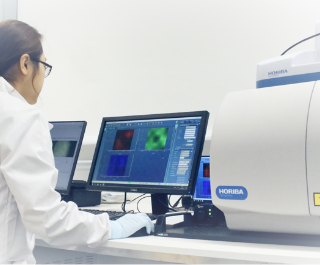



The Health Tech Hub and BRL Technology Solutions, comprising BRL’s Hardware Incubator and Robotics Innovation Facility, provide SMES with access to engineers, scientists, technology, equipment and laboratories. These programmes enable SMEs to develop and validate health tech concepts, run robotics and automation trials, and develop new robotic and autonomous systems and applications.
BRL’s innovation pipeline feeds directly into UWE’s University Enterprise Zone, which is collocated with Bristol Robotics Laboratory.
BRISTOL ROBOTICS LABORATORY
Bristol Robotics Laboratory is the most comprehensive academic centre for multi-disciplinary robotics research in the UK. An internationally recognised Centre of Excellence in Robotics, BRL’s state-of-the-art facilities cover an area of over 4,600 sq. metres (50,000 sq. feet).
BRL’s primary mission is to understand the science, engineering and social role of robotics and embedded intelligence. In particular, the key challenges surrounding adaptive robotics, namely: dealing with people and their unpredictability, unstructured and uncertain environments, and equipping robots for flexible roles.
BRL research addresses key areas of robot capabilities and applications, through 16 themes/centres, which include: artificial intelligence, smart automation, human-robot interaction, bio-energy & self-sustainable systems, tactile sensors & haptic feedback, aerial robotics, connected autonomous vehicles, swarm robotics, assistive technologies, medical & rehabilitation robotics, non-linear control, machine vision, robotics for nuclear environments, unconventional computation, verification & validation, soft robotics and robot ethics.
In addition to its core research activities, BRL offers PhD level research programmes through its EPSRC funded Centre for Doctoral Training in Robotics and Autonomous Systems. The Laboratory also offers a full range of taught courses at undergraduate and postgraduate levels, Masters level research programmes and selected internships.
BRL maintains strong national and international links with both industry and other research institutes and has an enviable track record of successful research and innovation, much of which is supported through BRL Technology Solutions (BTS), comprising BRL’s Hardware Incubator and Robotics Innovation Facility, which help businesses develop and deploy new robotic technologies.
On-site facilities include 37 (25m2) research bays equipped with numerous robots; a flying arena with Vicon 3D positioning systems; microbiology lab for developing microbial fuel cell technologies; fully sensored/networked assisted living studio for testing home robot solutions; driverless car workshop and test simulation suite; robotics for nuclear environments suite; chemical lab; polymer lab; 3 further temperature controlled wet labs; rapid prototyping/3D printing workshop; mechanical workshop; technicians workshop; hazardous test area for laser and x-ray testing; 16,000L pool for testing underwater robots; hardware incubator; robotics innovation facility; boardroom; seminar room; computer lab; electronics lab; dark room; maker lab; student hackspace.
BUSINESS INCUBATION AND GROW ON SPACE
Located in the new £16m University Enterprise Zone on Frenchay Campus, Launch Space provides physical incubator space and enterprise support for graduate start-up businesses. It is part of a wider entrepreneurial community – making it a great environment for graduate start-ups to flourish. We’re currently hosting a range of graduate-led, innovative and hightech businesses at various stages on the start-up journey – so if you join us, you’ll be working alongside other graduate entrepreneurs. The University has been allocated around £2,000,000 of funding from the European Regional Development Fund (ERDF) as part of the European Structural and Investment Funds (ESIF) Growth Programme 2014–2020. Established by the European Union, the ERDF helps local areas stimulate their economic development by investing in projects that support innovation, businesses, job creation and local community regeneration. The Department for Communities and Local Government (DCLG) is the Managing Authority for the Launch Space programme.
https://www1.uwe.ac.uk/about/enterprise/launchspace/aboutlaunchspace.aspx
The Hardware Incubator is a place where hardware start-ups can develop and grow new businesses. Created and hosted by the Bristol Robotics Laboratory, the incubator provides a unique service in the start-up landscape. As part of UWE’s University Enterprise Zone, it provides a level of support and understanding that is rarely found in traditional business incubators.
‘Hardware is hard!’ – it requires a multi-disciplinary approach to product development; electronics, embedded systems, mechanical design and software. Growing a hardware business is equally challenging, overcoming the problems of tooling and economies of scale. We understand these problems and have developed a community that is able to help new start-ups.
Alumni include Open Bionics, Reach Robotics, Homelync, Perceptual Robotics, and Folium Optics.
http://www.brl.ac.uk/businessengagement/technologyincubation1
Future Space connects entrepreneurs and tech innovators with scientists, researchers and graduate talent – to spark collaboration, innovation and growth.
Our community brings innovative coaching together with strategic partners and specialist advisors, we help you explore everything beyond your idea. With high tech facilities, lab and office space alongside access to research and funding schemes, potential partners and future customers, this is the space to develop and grow with the innovators of the future.
With focused commercial support including innovation coaching, regular workshops, events and conferences, you have access to expertise right where you work and create.
The Health Tech Hub located in the University of the West of England’s Enterprise Zone will support the development, evaluating and trialling of new products and innovations relating to independent living and home-based diagnostics. The Health Tech Hub’s aim is to support companies to develop new products associated with health and wellbeing. It provides support for SMEs with significant business activity in the West of England Region, provide bespoke laboratory testing and product development, accompanied by specialist support, enabling accelerated commercialisation and adoption into healthcare environments. The facilities include wet labs, electronics and prototyping labs, sensor design suite and a Living Lab test bed. We can also provide expert advice and support for product design and development, testing and validation and we have a large network of companies and support organisations, a rich resource for potential partners.
BRL’s Robotics Innovation Facility (RIF) empowers and enables SMEs in the LEP region to maximise the use of robotics for automation through the delivery of targeted business assists and technological development support.
The RIF invites SMEs from any sector in the LEP region seeking to deploy robotic technology to innovate manufacturing, industrial processes, and launch new products. The RIF provides access to robotic hardware, software, and appropriate scientific and technical support; enabling organisations to develop and undertake early stage testing of robotic solutions.
Since October 2013, RIFBristol has:
• Generated more than £22million to the economy
• Created over 75 new jobs
• Supported 57 six-week R&D collaborations
• Assisted over 620 clients, including 393 SMEs
Part of BRL Technology Solutions, the RIF continue to work closely with SMEs to identify how their business needs can be best addressed through the use of robotics and associated technologies. Improved technological processes will increase productivity; early product validation will support the development of new to market or new to firm products.
Tel: 0117 32 86913
Email: RIFbristol@uwe.ac.uk
“Where it comes all together”
The West of England Robotics network is an open access, community network for everyone interested in researching, developing and using robotics technologies, products and services. Robotics typically requires ‘systems integration’ where different skills and technologies need to be brought together to provide effective solutions. As technologists, businesses and users we need to know who to go to help us – and the aim of the West of England Robotics Network is to support and stimulate the growth of that interconnected community in our region.
The West of England Robotics Network is run by Bristol Robotics Laboratory, with support from South Gloucestershire Council and Invest Bristol & Bath, to create and share opportunities, help the formation and development of robotics companies and supply chains, and contribute to growing the region’s High Tech cluster. It welcomes individuals from all backgrounds, disciplines and interests.
Tel: 0117 32 86348 | Email: alisonwilmot@brl.ac.uk | Web: www.westofenglandroboticsnetwork.org
Preparation, advice, and submission of patents
-
Bristol Robotics Laboratory as part of UWE benefits from patent application experts who work for UWE’s Research and Business Innovation office.
-
UWE Bristol staff are obliged to advise their Dean and the Research, Business and Innovation team at rbi@uwe.ac.uk immediately, of any invention that they believe may be patentable. All UWE Bristol patents are filed by the Centre for Research, Innovation and Graduate Studies. Students are also advised to seek help. Do not discuss your application with third parties until your application is filed and you have been advised on the basis on which information can be shared. For advice on how to proceed before applying for patenting, please read the guide below from Research and Business Innovation Office.
-
For more general enquiries about patent searches contact Subject Librarian.
THE UNIVERSITY OF THE WEST OF ENGLAND POLICY ON INTELLECTUAL PROPERTY
1. INTRODUCTION
University of the West of England, Bristol (UWE Bristol) Intellectual Property Policy sets out the rights of its staff, research and taught students in relation to their intellect and creative output. UWE Bristol is an enterprising and entrepreneurial university and aims to encourage and facilitate the development and protection, where appropriate, of any Intellectual Property (IP) created.
This document sets out the policy in respect of the rights, responsibilities and procedures of the University and its staff and students in relation to intellectual property and material(s) created, to which UWE Bristol resources, including time, funds, facilities or expertise, have contributed.
This includes the ownership, development, commercialisation and exploitation of IP, and the sharing with staff or students any net revenue generated from IP.
UWE Bristol recognises that Intellectual Property generated by research and other work undertaken at the University is an important asset, and wishes to encourage all staff and students to contribute towards this activity. UWE Bristol also has the responsibility to identify, protect and manage its Intellectual Property effectively.
What is intellectual Property (IP)?
UWE Bristol defines Intellectual Property as patents, utility models, rights to inventions, copyright and related rights, trade marks and service marks, trade names and domain names, rights in get-up and trade dress, rights to goodwill or to sue for passing off or unfair competition, plant variety rights, rights in designs, rights in computer software, database rights, semiconductor topography rights, rights in confidential information (including know how and trade secrets) and any other intellectual property rights, in each case whether registered or unregistered and including all applications (or rights to apply) for, and renewals or extensions of, such rights and all similar or equivalent rights or forms of protection which subsist or will subsist now or in the future in any part of the world.
IP includes what might be termed ‘Scholarly Materials’ produced by employed staff in the normal course of their duties.
Certain IP (for example, patents, trademarks and designs) can be protected by registration.
Failure to register can have an impact on the ability of the IP owner to commercially exploit IP . The fact that IP may not have been registered does not, however, prevent the IP owner from asserting rights of ownership in relation to that IP including a right to commercially exploit.
2. WHO OWNS IP?
Employed staff
Under intellectual property laws (including the Registered Designs Act 1949, the Patents Act 1977, Copyright, Designs and Patents Act 1988, and Copyright and Rights in Databases Regulations 1997) Intellectual Property created by employees in the course of their employment is owned by their employer. This means that IP created by UWE Bristol staff in the normal course of their duties is owned by the University. UWE Bristol staff includes all those employed by the University through a formal employment contract and includes academic, professional services and research staff.
Employees working at other institutions
UWE Bristol staff may have honorary academic appointments at other institutions. In such circumstances, before UWE Bristol employee commences an honorary appointment, an agreement must be put in place, after consultation with UWE Bristol, between the university and the other institution in which should include terms establishing the ownership of any arising IP.
Employees working at partner NHS trusts
UWE Brsitol employees with clinical duties may also hold honorary contracts of employment with the relevant NHS partner trust. In such circumstances the ownership of IP will remain with the University unless specific arrangements with partner trusts for IP identification, ownership and exploitation have been agreed.
Individuals with honorary, visiting or emeritus status
The University awards honorary, visiting and emeritus status to some individuals. Such individuals are not formally employed by the University and will normally, therefore, own any IP they create. They may, however, be required under certain circumstances to transfer to the University any IP they create as if they were a University employee. This would include, for example, IP created jointly with a member of UWE Bristol staff in the course of his or her employment, created using UWE Bristol facilities or resources or created in the course of undertaking research or other activity for which the University is formally responsible.
Where such assignment is made, the individual may enter a revenue sharing agreement with the university using the same scheme that applies to University employees (see below).
Third parties
The University frequently enters into agreements with third parties which specify ownership of IP generated by University staff and students in research collaborations. In such cases IP may be owned by the University, the third party or jointly depending on who creates the IP and what the terms of agreement are.
Taught Students
Students registered on a taught degree programme at UWE Bristol will normally own any IP they create. Where students generate IP in the course of their academic studies they will normally own that IP in their own right. This includes all students registered on and undertaking a taught course at undergraduate or postgraduate level.
Exceptions to this may apply where, for example, the student:
-
has specifically agreed otherwise in writing with the university;
-
has a sponsored studentship under which the sponsor has a claim on the IP arising
-
as part of the terms of the sponsorship;
-
participates in a research programme or ‘live’ external company project where any
-
arising IP is to be owned by the sponsor of the research or project.
-
generates IP using UWE Bristol facilities and/or resources and is required to assign IP as a condition of use;
-
generates IP jointly with an employed member of UWE Bristol working in the course of his or her normal employment.
For questions or clarification please email tech.transfer@uwe.ac.uk
Where such assignment is made, the student may enter a revenue sharing agreement with the university using the same scheme that applies to University employees (see below)
For the avoidance of doubt UWE Bristol will have no claim to any IP created by the student without use of UWE Bristol’s facilities and/or resources.
Research Based Degrees
Students registered for research-based degrees (including PhD, ProfDoc and mPhil) may claim ownership of IP generated in the source of their studies only if they can clearly demonstrate that such IP has been created solely by themselves.
Typically, postgraduate students studying for research-based degrees use UWE facilities and work closely with UWE Bristol staff, including their Director of Studies, other supervisors, or other employees of the University. IP from their projects will often, therefore, have been created jointly by the student and University employees.
The University may therefore require that students undertaking research-based degrees assign any IP they create in the course of their studies to the University.
Where such assignment is made, the student may enter a revenue sharing agreement with the university using the same scheme that applies to University employees (see below).
Where the student’s programme is funded by an external organisation the student may be required, if (but only if) there is a contractual arrangement with that organisation to this effect, to transfer ownership of IP to that organisation.
3. DISCLOSURE AND THIRD PARTY IP
When undertaking work from which IP, covered by the Policy is generated or may be expected to be generated, all persons bound by the UWE Bristol IP Policy and Regulations must:
a) complete a copy of the UWE Bristol ‘INVENTION AND MATERIAL DISCLOSURE FORM’ as soon as reasonably possible to notify the university of any innovation, invention, IP, exploitable technology or material created
b) keep the nature of and matters relating to IP and material confidential (through proper use of confidentiality agreements etc.) until the fact and manner of disclosure is assessed by UWE Bristol
c) assist with the protection and exploitation of IP developed, keep suitable records of creation, and co-operate fully with UWE Bristol and its agents (e.g. external patent agents and lawyers)
d) disclose to the Executive Dean (or nominee) or the Director of RBI at the outset of the work, or as soon as they become aware of it – the ownership by a third party of any IP referred to or used for their work; or any pre-existing or independent IP which they themselves own which is proposed to be used by UWE Bristol.
e) assist UWE Bristol in taking such further steps as UWE Bristol deems reasonably necessary in order to resolve any issue that needs to be addressed in connection with any third party IP right that needs to be addressed whether before work commences or during the course of any project
4. COMMERCIALISING INTELLECTUAL PROPERTY
UWE Bristol Personnel (UWE Bristol employed staff or any person working under a contract for services with UWE Bristol) must inform UWE Bristol of any potential commercialisation of Intellectual Property owned by the University and any IP created using UWE Bristol facilities and/or resources.
Unless the University expressly authorises otherwise, commercialisation shall only take place under the direction of UWE Bristol and UWE Bristol shall determine whether it wishes to commercialise IP and if so the steps that need to be taken.
If UWE Bristol decides that it does not wish to commercialise IP it may license or assign the IP to the creators where it can be shown to its reasonable satisfaction that assigning ownership or licensing will be on terms to be agreed and which are consistent with UWE Bristol’s obligations as a charity and the use of public funds.
If the IP is commercialised by the creator, the University will be entitled to a share of revenue and UWE Bristol will normally require an ongoing licence in perpetuity to continue to use the IP for research (including commercial research) and teaching purposes.
UWE Bristol Personnel may not, without written authority from the University, enter into any discussions, negotiations, arrangements or agreements with any person or organisation in relation to any IP which belongs to UWE Bristol.
The University may, issue disclaimers of ownership of IP in appropriate cases and agree that the IP can be owned by the creators, for example for scholarly works.
Setting up a business or company for the exploitation of IP
UWE Bristol staff, students and/or other individuals covered by the IP Policy may wish to set up a business, for example by operating as a sole trader or forming a partnership, a limited company or other corporate structure (the ‘New Entity’), in order to exploit IP covered by this IP Policy. Before doing so they must seek and secure permission from the Board of Governors on the recommendation of the Vice Chancellor.
Permission will usually require that a viable business plan and relevant agreements and equity positions have been developed, the necessary funding, for example sources of investment have been identified and approved and the form of New Entity for exploitation has been determined
Permission from the Vice Chancellor or representative acting on his behalf and the relevant Dean of the Faculty involved are needed for any UWE Bristol staff to take up a Directorship of a company or to take up a partnership position that will involve University investment in the form of resources or assets (whether this be payment of money or payment in kind) .
UWE Bristol will normally be a shareholder (or equivalent) in any New Entity which involves UWE Bristol staff, resources or assets, or where UWE Bristol has previously provided funding to the project.
UWE Bristol will, normally, license on suitable terms any IP needed by the New Entity which may be either exclusive or non-exclusive.
UWE Bristol may choose to negotiate on its own behalf and/or on behalf of University staff with stakeholders (for example funding bodies, joint owners of IP with UWE Bristol, any present or previous sponsors of work at or with UWE Bristol) for any IP or information to which the New Entity needs access.
University staff or students involved in a New Entity need to seek and fund their own independent financial and legal advice (and in particular tax advice) in relation to the formation of a business or company under this Policy.
Any New Entity must take out its own insurance for risks including but not limited to: public liability insurance, professional indemnity insurance, employer’s liability insurance, cyber insurance, directors and officers insurance, buildings and contents insurance and product liability insurance, as appropriate.
REVENUE-SHARING OF PROCEEDS FROM THE EXPLOITATION OF IP
UWE Bristol will share any revenue from the exploitation of IP in which it has an interest with the relevant UWE Bristol staff, students or other individuals. UWE Bristol may have certain obligations or costs to meet before any revenue is distributed. The University may therefore deduct reasonable costs from gross revenue prior to the calculation of revenue shares and distribution where these costs are not externally funded or otherwise recoverable. These costs may include:
a) Royalties due to third parties including funders;
b) Costs and professional fees associated with the protection, maintenance, renewal and prosecution of the IP;
c) Costs associated with undertaking due diligence on the IP or materials;
d) Costs and professional fees associated with the defence of the IP;
e) Legal costs and professional fees associated with negotiation, legal agreements and advice;
f) Costs associated with marketing the IP (including travel costs); and
g) The costs of any development work that is not externally funded or recoverable by UWE Bristol;
h) Any tax payable in the UK or overseas.
i) Any interest payable due under any loan between UWE Bristol and the New Entity
j) Any capital payment due under any loan between UWE Bristol and the New Entity
k) Any other payment due to UWE Bristol under the terms of any Shareholder
agreement other than a dividend.
The sharing of ‘Net Revenues’ (calculated as set out above) from the exploitation of IP will normally be as follows:
a) UWE Bristol staff Share – 50% (to be apportioned as described below)
b) Faculty Share – 25%
c) University Share – 25%
Exceptions
a) UWE Bristol will not pay a royalty to employees for fundamental core activities, such as research undertaken within the normal course of duties or relating to teaching or CPD activities.
b) UWE Bristol will not pay a royalty on monies received from a third party by UWE Bristol to undertake research, consultancy or further development work.
c) UWE Bristol will not pay a royalty from monies received from the sale of shares associated with the exploitation of IP and this will be confirmed in the shareholders’ agreement for any New Entity – it is expected that inventors/creators would have shares themselves in the New Entity.
d) UWE Bristol will normally wait until the amount of royalty to be distributed is greater than £100 (one hundred pounds sterling) in any one lot before undertaking royalty distribution.
Where IP is generated by more than one inventor or creator, they are each responsible for informing UWE Bristol of the proportion of their individual contributions to its generation. For the purposes of distribution of inventor/creators’ shares in respect of Net Revenues received from exploitation of IP and material generated jointly it shall be the responsibility of the inventors/creators to agree their relative apportionment and to inform UWE Bristol in writing by completion of the “INTELLECTUAL PROPERTY: MATERIAL INCOME DISTRIBUTION FORM”. This document is an important part of the due diligence process and should be completed prior to the exploitation of any IP or materials.
Glossary of terms
To create
Create, devise, design, invent, discover, be the author of orotherwise originate any Intellectual Property and The Creator shall be interpreted as the individual or individuals that created the Intellectual Property.
Copyright
Broadly speaking copyright is a right to prevent various forms of copying and/or exploitation without the owner’s consent. It protects the expression of an idea and not the idea itself. Amongst other forms of expression, copyright protects written text, drawings and other works of art, photographs, music, dramatic works, sound recordings, films and computer programmes.
Due diligence IP
Due diligence aims to establish who is the legal owner of the IP and to also establish who has rights over it. Due diligence helps to identify and resolve any potential obstacles to the exploitation of the IP in question.
Intellectual Property or IP
Patents, utility models, rights to inventions, copyright and related rights, trade marks and service marks, trade names and domain names, rights in get-up and trade dress, rights to goodwill or to sue for passing off or unfair competition, plant variety rights, rights in designs, rights in computer software, database rights, semiconductor topography rights, rights in confidential information (including know how and trade secrets) and any other intellectual property rights, in each case whether registered or unregistered and including all
applications (or rights to apply) for, and renewals or extensions of, such rights and all similar or equivalent rights or forms of protection which subsist or will subsist now or in the future in any part of the world.
know how Information or expertise which is substantial, valuable and secret. It is not capable of registration and the only way of protecting it is to keep it confidential. It may be disclosed to others in confidence, preferably under an agreement such as a confidentiality agreement which sets out the terms of use of the know-how and which puts the party receiving the knowhow under an obligation to keep the information confidential.
Patents
A patent is an exclusive right granted for an invention which is new and offers a solution to a problem. A granted patent allows the owner to prevent others from using the product or process which has been patented (including making, selling, importing and exporting in a particular territory). The relevant country grants the patentee a monopoly for a limited period in return for the patentee agreeing to publish the idea or technology (this generally takes place at around 18 months from filing a patent application). Patents are territorial e.g. if you file a patent application in UK only, any granted patent will be effective only in UK. In order for an idea or technology to be patentable, it must be novel, inventive and have an industrial application. Broadly speaking this means that the idea must not have been seen anywhere in the world before a patent application has been filed at the relevant patent office.
Under UK law a patent has a life of 20 years from filing, provided annual renewal fees are paid to support the process.
Trade Mark
A trade mark (often referred to as a brand name) is a distinctive sign which identifies certain goods or services as those produced or provided by a particular person or enterprise. In UK a trade mark may be unregistered or an application may be made to register the mark at the UK Intellectual Property Office (‘IPO’). A trade mark is registered for defined classes of goods and/or services. A registered trade mark offers more protection than an unregistered trade mark and can be easier to defend, if it is found that someone else is using the mark for the same or similar goods or services to those for which it is registered. The period of protection for a trade mark varies, but can generally be renewed indefinitely, by payment of renewal fees to the UK IPO every ten years.
Commercialise
Realise commercial or financial benefit through the exploitation of Intellectual Property.
Scholarly Materials
Non commercial materials of a scholarly nature created by UWE Bristol Staff in the Course of their employment and potentially includes:
• academic journal articles;
• conference papers and related presentations;
• notes created only for the Employee’s own personal use;
• theses and dissertations;
• popular non-fiction, novels and poems;
• works of fine art,
• hard copy textbooks (unless such textbooks were developed using University administered-funds paid specifically to support textbook development.
For the avoidance of doubt Scholarly Materials do not include computer software
-




